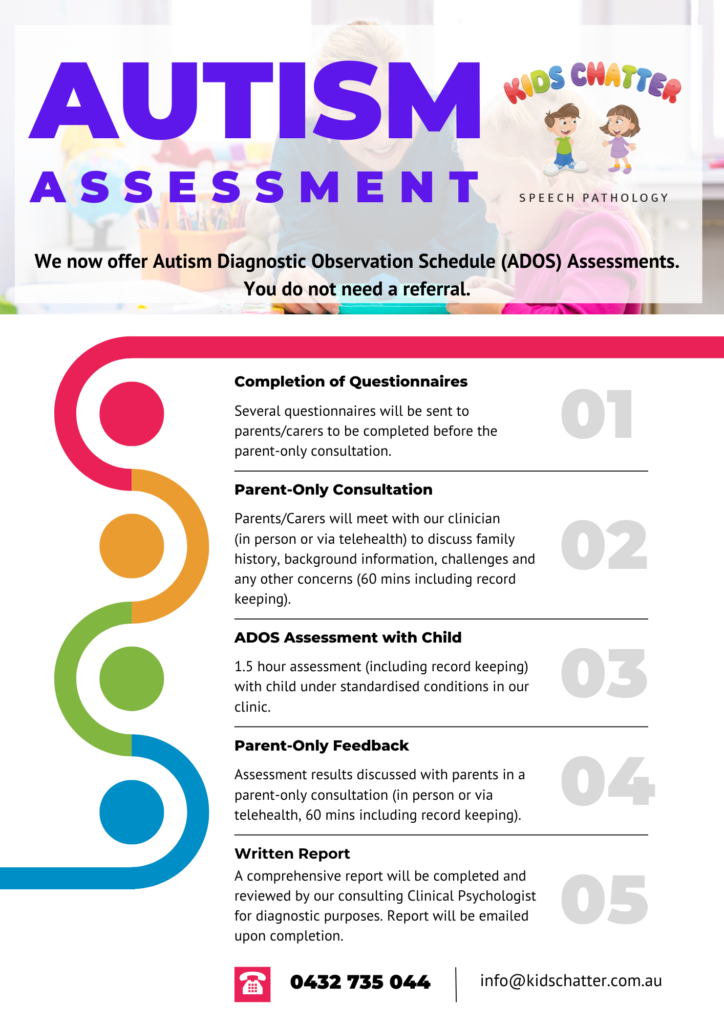We now offer Autism Assessments at our Kids Chatter Speech Pathology clinic in Indooroopilly, Brisbane.

What to Expect in the Assessment
Getting an Autism Assessment at Kids Chatter Speech Pathology involves 5 main steps:
- Completion of questionnaires to gather background and developmental information about your child
- Parent-Only consultation prior to the assessment with your child
- In clinic assessment with your child
- Parent-Only feedback to discuss the results
- Comprehensive written report
(See the flyer below for additional details)
Our assessments are all conducted in our Indooroopilly clinic with our Speech Language Pathologist. After the assessment has been completed, together with the various questionnaire information we have gathered from you, the assessment findings are reviewed with our Speech Language Pathologist and consulting Clinical Psychologist, Kathleen Cleland from MindScope as part of our multidisciplinary assessment team.
During the parent-only feedback session, we will discuss the findings, diagnosis and recommendations and answer any further questions or concerns you may have. A comprehensive written report will be emailed to you within 3 – 4 weeks.

Cost
$193.99/hour
Total number of hours between SLP and Psych: 10 hours
Total cost: $1,939.90
Call us to enquire or make a booking 0432 735 044What is Autism?
Autism spectrum disorder (ASD) is a lifelong developmental condition that affects how individuals behave and interact with the world around them.
In autistic individuals, brain development differs from non-autistic people and ASD can present differently between boys and girls.
ASD is not a mental health disorder or an intellectual disability, however some autistic people may experience these challenges as well as being autistic.
People with ASD can range from being highly intelligent to having normal intelligence or having an intellectual disability. While they may face certain challenges, they also possess unique strengths.
Previously, Asperger’s syndrome and autism were thought to be separate conditions, but they are now understood to fall under the single umbrella of autism spectrum disorder (ASD).
In Australia, approximately 1 in 150 people are diagnosed with ASD.
The signs of ASD typically emerge in early childhood, often becoming apparent between 2 and 3 years of age, although some individuals may be diagnosed later in life.
Most autistic people can acquire the skills needed to live independently or within a supportive environment. Research shows the importance of early diagnosis and intervention.
A delayed ASD diagnosis can have significant repercussions, potentially affecting a person’s mental health, education, development, and social life. It may also increase the risk of bullying, abuse and violence.
Early diagnosis of ASD is crucial as it enables access to support sooner, increasing the likelihood of developing essential skills such as:
- Communication skills
- Social skills
- Daily living skills
These skills are vital for enhancing quality of life.
What are the Characteristics of Autism?
The main characteristics related to ASD fall into 2 broad areas:
- Difficulty with social interactions and communication
- Restricted and repetitive behaviours and interests
The common signs and traits of ASD in children include the following:
- lack of social or emotional exchanges like pointing, smiling, showing you things
- lack of non-verbal communication such as nodding and shaking head, using hand gestures
- difficulty developing and maintaining relationships appropriate to their age, such as peer play, lack of close friends
- delayed receptive and expressive language skills
- loss of language skills at any age
- lack of eye contact when speaking
- excessively following routines, patterns or behaviour, and becoming distressed at changes
- stereotyped or repetitive speech
- using objects in unusual ways
- movements, such as flapping hands, toe-walking
- strongly reacting to sensory input like loud sounds, bright lights, pain or textures
- restricted or fixated interests such as only playing with certain toys or talking about certain topics
- having difficulty managing emotions, such as frequent and long tantrums/meltdowns
Reasons for Having an Autism Assessment
An autism assessment may be recommended by an educator or health professional who supports your child, or you as a parent/caregiver are concerned. A diagnosis can help:
- Support self-identity and well-being of your child.
- Develop awareness and acceptance of their unique differences, strengths and challenges.
- Access the right services and supports.
- Access funding (such as NDIS funding) for therapy and services, if eligible.

